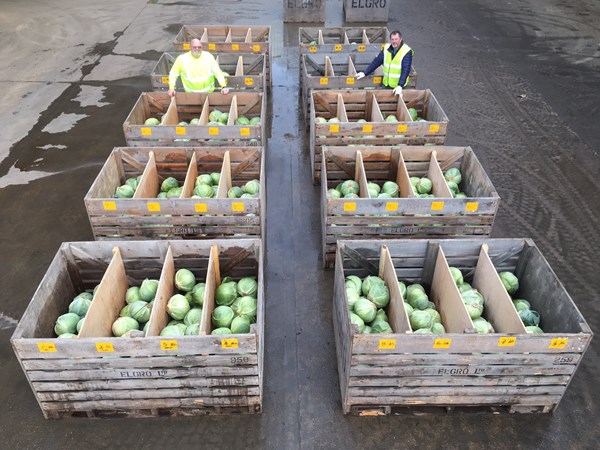Please click here to access the main AHDB website and other sectors.
- Home
- Projects
- Farm Excellence
- Strategic Centre for Field Vegetables - Brassicas
Strategic Centre for Field Vegetables - Brassicas
About Strategic Centre for Field Vegetables - Brassicas
- The Strategic Centres for Field Vegetables showcased research and technology that was carried out to improve integrated pest management (IPM) strategies.
- There were demonstration sites around the UK, which focused on four key crops; carrots, peas, onions and brassicas.
- The Strategic Centres for Field Vegetables built on the success of AHDB’s variety trial programme, by expanding to incorporate grower-led research trials.
There were two trial sites for the Strategic Centre for Field Vegetables – Brassicas, one in Lincolnshire (Elsoms Seeds Ltd, Spalding, PE11 1QG) and one in Cornwall (Trevarnon Farm, by kind permission of Neil Hosking, Hayle, TR27 5EB)
Work Programme and results for the 2019/20 season
In 2019/20 the Strategic Centre for brassicas consisted of variety trials conducted by Bill Herring of Duchy College and field trials in Lincolnshire conducted by Angela Huckle of ADAS.
For the full report on each work area, go to the Strategic Centre for Field Vegetables project page.
Variety evaluation in Cornwall
The 2019/20 Variety trial was hosted by a commercial grower in Cornwall.
Trials include autumn cauliflower, winter cauliflower, summer cauliflower and spring cabbage. Two planting dates were included, harvesting twice a week with weekly pest monitoring.
In addition to the core cultivars, new confidential introductions were recorded, as requested by the seed companies to encourage new cultivars to be tried and tested under local conditions.
Autumn cauliflower variety evaluation
The seven different autumn cauliflower varieties trialled in 2019/20 were Skywalker, Jericho, Denton, Amandine, Milandes, CAU 02944 and SV 5965. The variety Jericho gave the highest percentage of class 1 crop, at 94%, with an average 50% cut date of 15th October 2020. Amandine was a close second with 93% class 1.
The advantage of trialling varieties over several years is that the influence of growing conditions and weather patterns, which affect growth, harvesting periods and crop quality, can be averaged over several seasons, providing a more accurate guide to the grower to assist with crop planning and projected yields. The number of season’s that each variety is trialled varies from two to six years for different varieties.
Winter cauliflower variety trial
34 varieties from seven seedhouses were transplanted on 15 and 24 July 2019 at a density of 21192/ha. Good ground conditions resulted in excellent establishment and a harvesting period from early November to the end of March 2020. In 2019/20 percentage class 1 produce varied from 67% to a highest percentage of 93% for the variety Stromness.
Winter cauliflower averages (1 – 7 years in trial) are also given in the trial report.
Late winter cauliflower
Seven varieties from four different seedhouses, transplanted on the same dates in July also established well. Percentage class 1 produce varied from 72% to 93% for the variety Fletcher.
Spring greens
Five varieties from three seedhouses. In this case the later transplanting date of 5 September meant that the extremely wet autumn impacted on establishment and subsequent growth of some varieties. Comments and an average weight of marketable green on the harvest date of 28 March 2020 are given for all varieties.
Lincolnshire
Storage cabbage
The autumn of 2019 was particularly wet. Growers of storage cabbage in Lincolnshire recorded losses of up to 50% when they came to take their crop out of storage in the spring of 2020. Previous SCEPTREplus trials had identified the biological product Serenade ASO as being useful in the control of Botrytis and Phytophthora. However, it did not provide adequate protection under these extreme conditions.
Growers wanted to conduct a trial to find a more effective product to protect cabbage in store. As a result, a trial was developed which sought to address the problem.
The cabbage crop to be used in the trial was produced using normal grower commercial practice. Batches of cabbage were drenched with a range of 10 different treatments (including untreated and Serenade ASO) with four replicates and put into store at Allium and Brassica Centre on 24 November. The crop will be taken out of storage in April/May 2021 and treatments assessed for efficacy.
Treatments were selected on the basis of their potential efficacy and likelihood of approval if shown to be effective and residue samples were taken from the most promising treatments to help fast-track them for approval. The aim was to gain an EAMU approval for an effective plant protection product.
Post planting herbicides – cauliflower, kale and collards
The aim of these trials was to build upon the information generated in SCEPTREplus on the types of brassicas not included in the original trials.
No pre-planting herbicides were applied. The treatments were applied three days after planting and one month after planting, in different mixes and at different rates. Standard treatments were Lentagran at 2.0 kg/ha and Dow Shield at 0.5 L/ha, and the trial was replicated three times.
Trial results were presented to brassica growers on 14 November and the trial report is available on the Strategic Centre for Field Vegetables project page.


